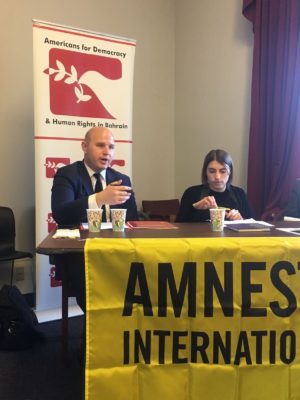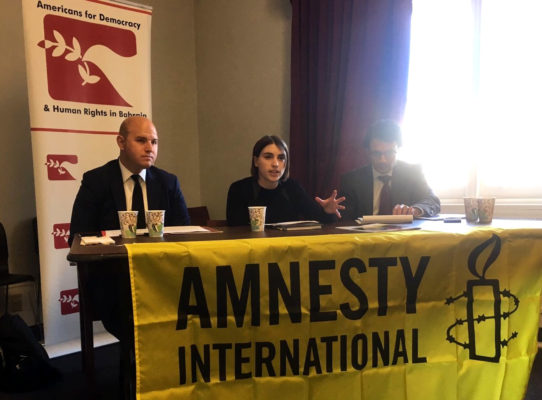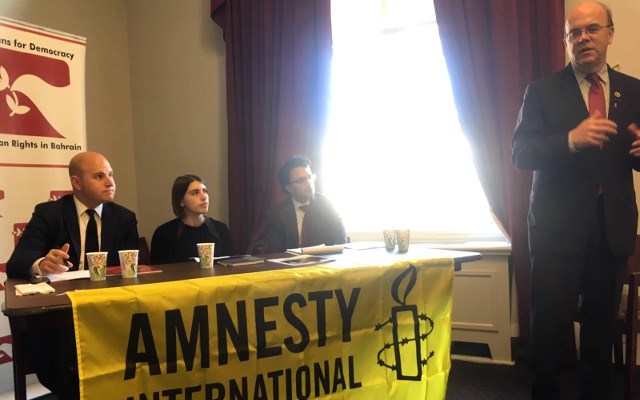On 1 December 2016 Americans for Democracy & Human Rights in Bahrain (ADHRB) and Amnesty International hosted an event in Congress entitled “Bahrain’s Fake Reform? Human Rights Failures on the Eve of the Manama Dialogue.” The event largely discussed how institutions set up after 2011 to address and prevent human rights violations have failed to break the government’s long-standing culture of impunity.

Representative James McGovern (D-MA), Co-Chair of the Tom Lantos Human Rights Commission (TLHRC), hosted the event and delivered opening remarks. Rep. McGovern noted that the human rights situation in Bahrain is “awful.” There remains much to be done by the Government of Bahrain in order for officials to address institutional human rights abuses. Over the course of the last six months, the Bahraini government has escalated its repression of civil society, thus exemplifying how promises of reform by Bahraini officials are insincere. “Still,” Rep. McGovern stated, “there is an opportunity for Bahraini authorities to initiate constructive dialogue.” But the window for that opportunity is constantly shrinking as authorities continue to close space for civil society.

Amnesty International’s Bahrain Campaigner, Ariel Plotkin, began with her remarks about the recently released report from Amnesty International, Window-Dressing or Pioneers of Change? An Assessment of Bahrain’s Human Rights Oversight Bodies. The report addresses the failures of human rights oversight institutions created as a response to the 2011 pro-democracy movement. The Bahraini government created the office of the Ombudsman of the Ministry of Interior (MOI) in February 2012 and the Special Investigations Unit (SIU) in March 2012 as mandated by the recommendations in the Bahrain Independent Commission of Inquiry (BICI). Now, more than three years after the institutions were set up, what have they done? Amnesty International and ADHRB claims that very little progress has been made to prevent human rights violations and hold perpetrators accountable. Amnesty International conducted 500 interviews with victims and their family members to document instances where individuals were victims of abuses. The organization found that there are a very limited number of instances where these oversight institutions were helpful in forcing officials to disclose the whereabouts of disappeared detainees. Yet, these institutions overwhelmingly fail to prevent abuses. The Ombudsman and the SIU have mandates to conduct investigations where human rights violations, such as torture, may occur. “On paper,” Plotkin said, “these institutions look good. But in practice, it is a different reality.” The institutions are slow in ensure that prisoners have adequate access to medical care. They are equally slow to initiate an investigation when families claim detainees are at great risk of torture, as seen in the cases of Husain Jawad and Mohammed Ramadan. Amnesty International called on the US government to urge the Ombudsman and SIU to implement recommendations in the report and raise concerns to the Bahraini government about the overall lack of accountability in Bahrain.

Michael Payne, International Advocacy Officer from ADHRB, then delivered his remarks. On 9 December, US officials will travel to Bahrain’s capital to attend the 12th annual Manama Dialogue, a high-level summit focused on major regional security issues. On the docket will be some of the Middle East’s most pressing strategic challenges, such as countering violent extremism and resolving ongoing conflict in Syria, Yemen, Libya, and Iraq. What will likely go unaddressed is the heightened risk of domestic instability from within the Arab Gulf, and specifically the role of the dialogue’s hosts in a deepening political crisis at home. Though the Bahraini government appears to have taken a step forward by establishing institutions like the Ombudsman or the SIU, it has recently taken several major steps back. In just the last six months, Bahraini authorities have forcibly exiled activistZainab al-Khawaja; dissolved the largest opposition group, Al-Wefaq National Islamic Society; rearrested human rights defender and Bahrain Center for Human Rights president Nabeel Rajab; charged interfaith leader Sheikh Maytham al-Salman; and summoned more than 70 Shia religious figures on allegations linked solely to sermons and peaceful demonstrations. This Sunday, courts will hear cases against Al-Wefaq’s Secretary-General Sheikh Ali Salman and the country’s most prominent Shia cleric, Sheikh Isa Qassim, who was also stripped of his citizenship in June. Additionally, over the past several weeks, the government has expanded this attack to nearly all facets of political and civil society space, judicially harassing dozens of activists, journalists, and lawyers.

As a major non-NATO ally, Bahrain is eligible for a degree of US military assistance unavailable to a majority of the world’s nations, and the Bahraini security forces are equipped with US weaponry. In 2010, just before the 2011 popular uprising, the US approved the sale of approximately $200 million worth of arms to Bahrain. Moreover, the country also remains home to the US Fifth Fleet, one of America’s most important naval commands. Without a course correction, Bahrain is bound for an even more severe bout of unrest than it experienced in 2011, matching what is quickly amounting to unprecedented levels of repression. It should be of chief concern to US policymakers that it is not American-made weapons turned – with tacit American approval – against the next generation of peaceful protestors. With the current administration coming to the close, the Dialogue may indeed be the last opportunity for the US to urge real change, and secure real stability, in one of its closest allies.
In a followup question to the discussion, the question was raised what the US could do going forward in 2017? Payne noted that one thing the new Congress could do is reintroduce legislation similar the current Bahrain Independent Commission of Inquiry (BICI) Accountability Act of 2015. Such legislation would prevent arms sales to the country’s Bahrain Defense Force (BDF) until the US Department of State certifies that the Government of Bahrain has implemented all 26 recommendations in the BICI. Plotkin also raised that the US administration could engage with Bahrain during its 3rd Cycle of the Universal Periodic Review (UPR) and submit recommendations to address the failing oversight institutions.
Please click here for a PDF of this event summary.





